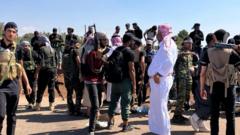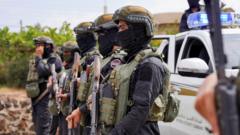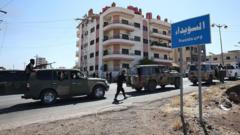In a significant development within the ongoing turmoil in southern Syria, the government has begun evacuating Bedouin families after a week of intense violence that saw over a thousand fatalities, reflecting deep-seated sectarian tensions.
Syria's Government Evacuates Bedouin Families Amid Escalating Violence

Syria's Government Evacuates Bedouin Families Amid Escalating Violence
Cease-fire follows deadly clashes between tribes and Druse minority in Sweida Province, raising sectarian fears.
The Syrian government has announced the evacuation of hundreds of Bedouin families from the Sweida Province following a cease-fire agreement that was struck after days of escalating violence between armed Bedouin tribes and local Druse militias. This intervention from the government comes after a concerning surge in sectarian clashes that has raised fears of broader conflict in the region.
According to reports from the Syrian Observatory for Human Rights, a British-based monitoring group, the clashes resulted in over 1,100 fatalities within just eight days as armed factions faced off against each other. The violence not only jeopardized the civilian population but also attracted Israeli military engagement, with Israel conducting airstrikes on Syrian government positions in Damascus, claiming to act in defense of the Druse, who were under threat from the ongoing hostilities.
On Saturday, Syrian authorities announced the cease-fire and expressed a commitment to restoring order to the volatile province, stating that security forces would be deployed to protect civilians and secure the area. Despite the cease-fire, reports of sporadic violence continued, illustrating the fragile nature of peace in the region.
In a televised address, Syrian President Ahmed al-Shara described the recent outbreak of violence as a “dangerous turning point” as the government worked to stabilize the situation. He indicated that Israeli involvement in the conflict has escalated these tensions and poses further risks to national stability.
As Bedouin families evacuated the region in both personal vehicles and government transport, Brig. Gen. Ahmad al-Dalati assured that the authorities were facilitating their exit for safety, admitting that many had found themselves caught in the crossfire and were effectively hostages in their own community.
The conflict between the Druse minority and the Bedouin tribes has historically been rooted in disputes over land rights, revealing deep-seated grievances that have now resurfaced amidst the backdrop of Syria's prolonged civil war.
The situation remains precarious, as deeper divisions and cycles of violence cast shadows over potential paths to peace in the region. As the Syrian government attempts to navigate these turbulent waters, the international community watches closely, aware that the implications stretch beyond the boundaries of the province.
According to reports from the Syrian Observatory for Human Rights, a British-based monitoring group, the clashes resulted in over 1,100 fatalities within just eight days as armed factions faced off against each other. The violence not only jeopardized the civilian population but also attracted Israeli military engagement, with Israel conducting airstrikes on Syrian government positions in Damascus, claiming to act in defense of the Druse, who were under threat from the ongoing hostilities.
On Saturday, Syrian authorities announced the cease-fire and expressed a commitment to restoring order to the volatile province, stating that security forces would be deployed to protect civilians and secure the area. Despite the cease-fire, reports of sporadic violence continued, illustrating the fragile nature of peace in the region.
In a televised address, Syrian President Ahmed al-Shara described the recent outbreak of violence as a “dangerous turning point” as the government worked to stabilize the situation. He indicated that Israeli involvement in the conflict has escalated these tensions and poses further risks to national stability.
As Bedouin families evacuated the region in both personal vehicles and government transport, Brig. Gen. Ahmad al-Dalati assured that the authorities were facilitating their exit for safety, admitting that many had found themselves caught in the crossfire and were effectively hostages in their own community.
The conflict between the Druse minority and the Bedouin tribes has historically been rooted in disputes over land rights, revealing deep-seated grievances that have now resurfaced amidst the backdrop of Syria's prolonged civil war.
The situation remains precarious, as deeper divisions and cycles of violence cast shadows over potential paths to peace in the region. As the Syrian government attempts to navigate these turbulent waters, the international community watches closely, aware that the implications stretch beyond the boundaries of the province.





















